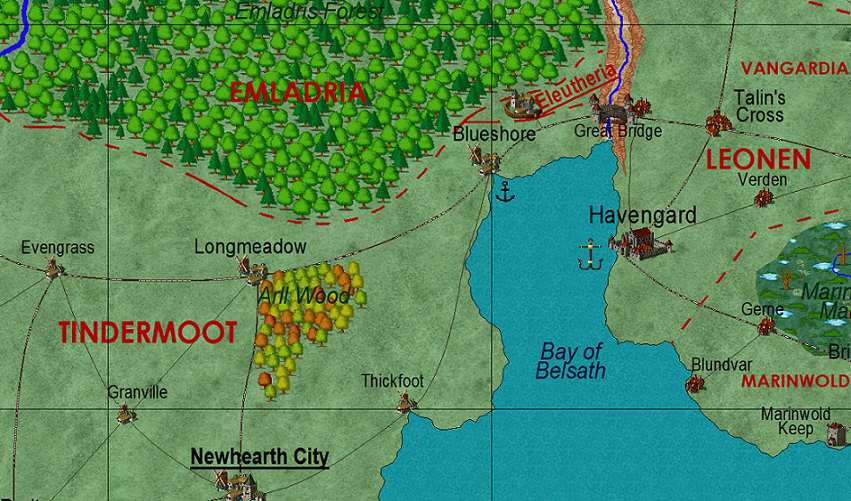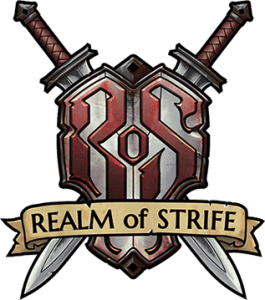Eleutheria is a fledgling free city-state founded by the group known as Heroes Guild in the wake of the War for the Tindermoot. Located northeast of Blueshore on lands once belonging to the Tindermoot, Eleutheria is often referred to as the City of Guilds due to its unique guild-based system of governance. Though primarily populated by displaced refugees from the War for the Tindermoot, it has attracted peoples from throughout Norlanin as it continues to flourish.
Current Governance: The Guild Council, under Guild Commander Brodash
The concept for the free city-state of Eleutheria was created in part by Lucas Dorozio (Calgary, Alberta) as part of his ‘Foot Knight’ backer reward from the 2014 Realm of Strife Kickstarter Campaign.

Contents
A Brief History
Heroes Camp
The founding of Eleutheria is uniquely tied to the War for the Tindermoot, during which a group of self proclaimed Heroes for hire rose to prominence as one of the major factions of the conflict.
Calling themselves Heroes Guild, the group had established a small settlement locally known as Heroes Camp on the future site of what would become the City-State of Eleutheria. Rumors claim the site was chosen due to the presence of a strange magical anomaly discovered by the Guild, though if true, it is a closely guarded Guild secret as no factual evidence exists.
Under the leadership of their Guild Commander, a fearsome Orc named Brodash, Heroes Guild built a name for themselves among the Halflings. Heroes Camp saw modest growth in the years leading up to the war, as camp followers slowly joined the Guild’s ranks and the settlement expanded. Of note from those early days is the now famous Stronghand Halfling family, who would become the leaders of the powerful Carpenters Guild, and also the Hilderbrand Dwarves; Rolgor, Uldor, and Halmand, all famous craftsmen in their own right.
Perhaps most noteworthy of all those earlier followers is the Friar, Tomberry Brownbeard, the Dwarven brewing genius behind the now famous Brownbeard Kinr Mead, a wildly popular drink among Halflings that is exported throughout the Tindermoot and beyond. It is said the the profit from his exports helped build Eleutheria in the early days.
Heroes Guild Goes to War
But it was not until the War itself broke out that Heroes Camp truly began to grow. The events of the War for the Tindermoot are detailed elsewhere, as are the exploits of Heroes Guild. The growth during this time was due in large part to the arrival of droves of Halfling refugees, displaced by the war with their homes destroyed or occupied by minions of the Black Dragonflight. Heroes Guild would not turn them away, and a refugee camp quickly sprang up around their holdings.
When the conflict finally came to an end, upon the last battlefield in the wartorn Halfling town of Pearl, Heroes Guild remained in there for a time to assist the survivors in any way they could. But eventually Commander Brodash released his forces to return to Heroes Camp. As they traveled east they stopped in many settlements along the way to assure them that now that the threat of the Black Dragonflight had ended, there was no need to continue paying protection money to Heroes Guild. Released from their obligations, the common folk of the Tindermoot sang the accolades of the Heroes who rose up to defend them. The Guild was sure to mention that should their services ever be required again, they would always be available as heroes for hire.
After a long and brutal conflict, the guild and its allies were deserving of much needed rest, however they found none upon arriving back at Heroes Camp. The already sizeable refugee camp that had sprung up around the Guild’s fortified holdings had grown even larger during their absence in the closing weeks of the campaign. What greeted them was a sprawling refugee city of tents and hastily constructed shacks. While many of the Halflings appeared weak and malnourished, the arrival of the guild’s forces was met with celebration. Halflings lined the makeshift streets to thank the homecoming heroes and cheer them on.
For days the refugee city around Heroes Camp was plunged into wild celebration as Halflings and Heroes raised tankards of ale and mead together. When the revelry finally subsided the stark reality of so many mouths to feed emerged once again. Commander Brodash sent word throughout the refugee city that it was now safe to return to their homes, and that they should begin making preparations to disembark as soon as possible.
To his surprise, several days after issuing his decree, Brodash discovered that very few of the Halfling refugees had made any preparations to leave. Instead, the Halflings sent forth representatives to inform the Guild that most of their number did not wish to return to their homes, or in many cases no longer had homes to return to. This left Heroes Guild with a significant conundrum, for they lacked the resources and land to house so many for any significant length time. Recognizing that the refugee city would eventually plunge into a lawless and chaotic settlement on their very doorstep if left to its own devices, the Guild sent their ambassador, the Elven Swashbuckler Lolinder, to Newhearth City to discuss terms with the Tindermoot government for the relocation of the refugees.
Newhearth City claimed that in the wake of the Black Dragonflight’s campaign of suffering and destruction throughout the Tindermoot, they lacked the necessary resources to deal with the refugee situation at Heroes Camp. After much deliberation among the Tindermoot Assembly, Prime Minister Heplin Bellypot put forward a resolution to annex the lands located at Heroes Camp, including not only the area occupied by Heroes Guild’s existing fortifications and the refugee city, but also farm lands and natural resources in the surrounding area, stretching East to the edge of Belsath canyon, bounded in the North by the Emladris Forest and in the South reaching almost to the highway between the Tindermoot and Leonen. Recognizing the significant role that Heroes Guild played in protecting the Tindermoot when they themselves failed to do so, the Assembly voted almost unanimously in favor of the resolution, awarding Heroes Guild an official Charter, granting them the right to self-governance of these lands.
Founding Charter
Returning with the Charter, Ambassador Lolinder brought the proposal before Commander Brodash and the other officers of the Guild. While the initial prospect was exciting they quickly realized they would be taking on a significant responsibility if they accepted it. However, the only alternative would be to forcibly remove the refugees from their camp, a prospect no one had the stomach for. The Heroes Guild ultimately accepted the Charter and founded their own City State, which they named Eleutheria, from the old Halfling dialect for liberty, the very principle upon which they wished to found their new city.
The Guild wasted no time in organizing and restructuring the refugee city. They began by clearing out the temporary shelters and relocating the camps further afield while beginning construction of permanent housing, shops, taverns, and all the structures necessary for a functioning city. It was a monumental task, but Heroes Guild was fortunate to have the assistance from some of the long-time residents of Heroes Camp, who in turn mobilized work forces from among the eager refugee Halflings.
City of Guilds
As the need for a more functional organizational structure emerged, Heroes Guild looked to the system of governance they knew best: the Guild. They created a variety of Guilds to see to the work of building their new city, initially commissioning a Carpenter’s Guild under the guidance of the Stronghand family, a Smith’s Guilds under the Hilderbrand brothers Rolgor and Uldor, a Stonemason’s Guild under their cousin Halmand Hilderbrand, and a Farmer’s guild under a Halfling named Urry Gargoman, who had rallied some of the local farmers in the last days of the war to attempt to feed the endless tide of refugees. Eventually more Guilds formed as new needs were addressed, and soon the newly formed city of Eleutheria became known as the City of Guilds.
Realizing they could neither run their new city by themselves nor wished to be bogged down by the administrative challenges of government, Heroes Guild formed the Guild Council, a loose governing body made up of a single representative from each Guild. In this manner each Guild would have its unique concerns represented while ensuring no one guild could dictate how the city should be governed. At the head of the Guild Council would be the Commander, a position of authority retained by Brodash, but intended to eventually become an elected position from among the members of the Council of Guilds.
The only exception to the governance of Eleutheria would be that as the city expanded, Heroes Guild would remain autonomous within its original fortified compound of Heroes Camp. This right would also be extended to any Guild in Eleutheria that retained its own compound within the city, for Commander Brodash believed foremost that Guilds should be allowed to govern themselves in a manner they deem fit.
As Heroes Guild and the other newly formed Guilds toiled together to build a prosperous future for their city, other organizations took an interest. Foremost among them is the Sisters of the Healing Hands, whose Abbottess had been responsible for resurrecting several members of Heroes Guild throughout the violent conflict. So central had she become to the Heroes Guild war effort that when they had been forced to abandon Pearl midway through the campaign, they evacuated the Abbey and kidnapped the Abbottess when she refused to leave her post. While the Abbottess claimed to hold no ill feelings towards Heroes Guild, she asked to be released to return to Pearl to rebuild her Abbey. She left behind one of her fellow Sisters to establish a Priory on the outskirts of Eleutheria so the Order could attend to the needs of the Halfling community.
Ties to Volanthia
Also expressing a keen interest in the development of Eleutheria is Volanthia, the City Mages far to the north. In keeping close ties with their ally Leonen, a Kingdom distrustful of magic and home of the Royal Order of Archons, the Tindermoot did not officially allow for the presence of the Mage Colleges within their borders. However, because Eleutheria and its lands were no longer governed by the laws of Tindermoot and free of the direct influence of Leonen, the mage Colleges of Volanthia saw the opportunity to install an outpost in the newly formed City-State, on the very door-step of Leonen, to oversee their interests in the area.
The outpost was placed under the direct control of Mastermage Pippendula Portigalia, herself a member of Heroes Guild and a hero of the war. This arrangement allowed her to continue her valuable research on a nearby deposit of mysterious focusing crystals, with more substantial support from Volanthia itself. Already the Volanthian outpost has drawn eager new apprentices and undermages within its walls and has become a dominant fixture within the new city.
The Future
The future of Eleutheria is uncertain. Currently it flourishes and prospers under the governance of the Council of Guilds, but it is unclear if this system will have the capability to govern effectively in the long term, particularly with the influx of people from all races and walks of life throughout Norlanin drawn by the prospect of wealth and opportunity. While the Halflings of the Tindermoot seem at ease with Eleutheria prospering in land that was once their own, to the east the Kingdom of Leonen keeps a watchful eye upon their new neighbor.





